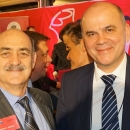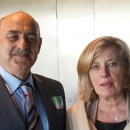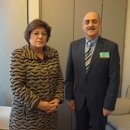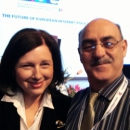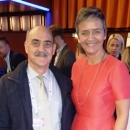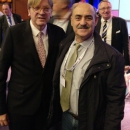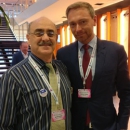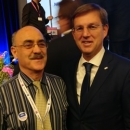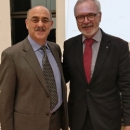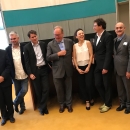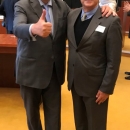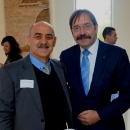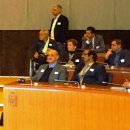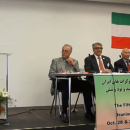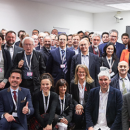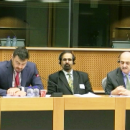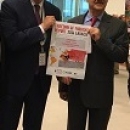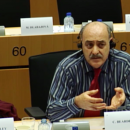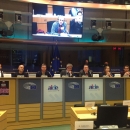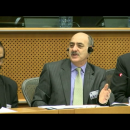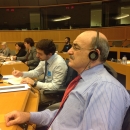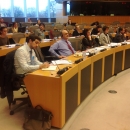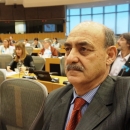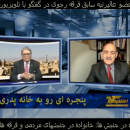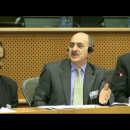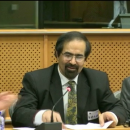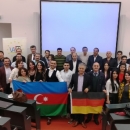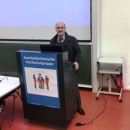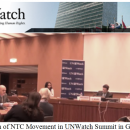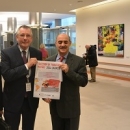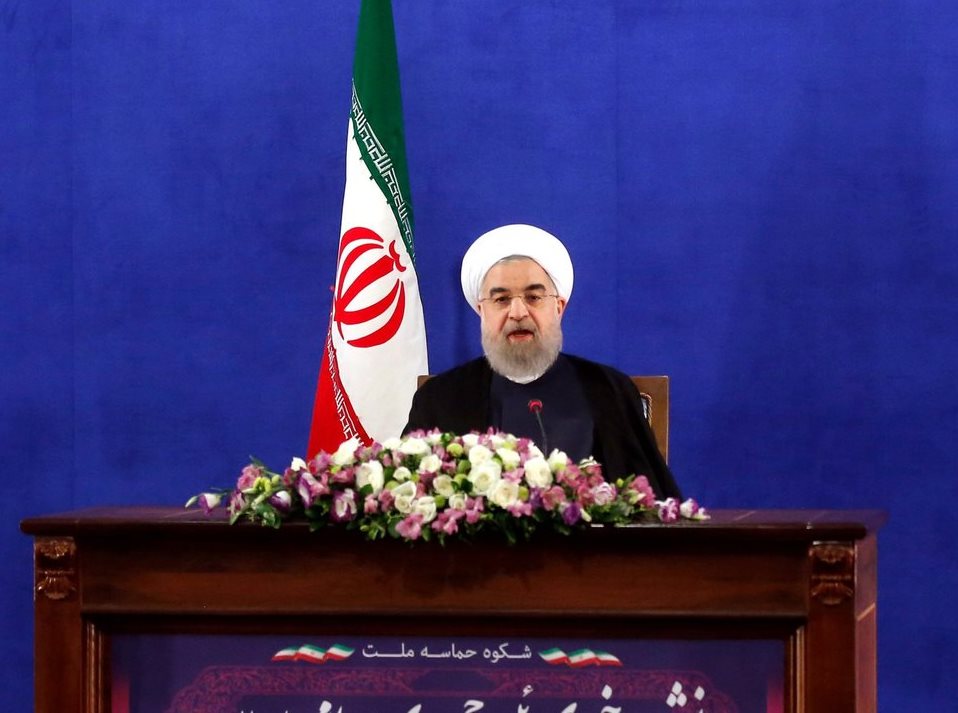By THOMAS ERDBRINK and RICK GLADSTONEMAY 22, 2017
President Hassan Rouhani of Iran said at a news conference on Monday in Tehran that President Trump’s meeting with Saudi leaders would not “have any political and practical value.” Credit European Pressphoto Agency
TEHRAN — Flush from his decisive re-election victory, Iran’s president struck back on Monday after a weekend of verbal affronts from the Saudi-American summit meeting, describing President Trump’s visit to Riyadh as empty theatrics and mocking his support for a monarchy that has “never seen a ballot box.”
At a news conference in Tehran, President Hassan Rouhani, a moderate cleric who has sought to open up Iran, said his victory on Friday over a hard-line conservative challenger showed that Iranians had exercised a democratic choice.
Mr. Rouhani suggested that he remained open to dialogue with the United States. But he did not waste the opportunity to exploit the contrasting optics created by Mr. Trump’s visit with Saudi Arabia’s ruling monarchs at the moment Mr. Rouhani’s victory was confirmed.
“Mr. Trump arrived in the region at the time when he saw 45 million Iranians participating in the elections,” Mr. Rouhani said. “Then he visited a country that I doubt knows the definition of elections. The poor things have never seen a ballot box.”
He added, “I hope one day Saudi Arabia chooses this path.”
Mr. Rouhani gained further momentum from local election victories on Friday by fellow reformists and moderates in at least eight major cities, according to newly posted results. Those cities include Tehran, where supporters of Mr. Rouhani are now in position to oust its hard-line conservative mayor of 14 years.
Mr. Rouhani’s remarks amounted to an emphatic denunciation of the Saudi monarchy’s extravagant welcome for Mr. Trump in Riyadh on Saturday and Sunday and their portrayal of Iran as the destabilizing force in the region.
Rejecting American warnings about testing missiles, Mr. Rouhani said that Iran’s weapons were defensive and that the country would test them whenever it deemed necessary.
He also ridiculed the $110 billion arms deal the United States and Saudi Arabia announced during Mr. Trump’s visit, suggesting that it was Saudi Arabia’s way of making amends for the Sept. 11 attacks.
Those attacks were plotted by the Saudi-born leader of Al Qaeda at the time, Osama bin Laden, and at least 15 of the plotters were Saudi citizens.
“I do not think the American people are ready to trade the lives they lost in Sept. 11 with billions of dollars gained through weapons sales,” Mr. Rouhani said.
He called Mr. Trump’s meeting with Saudi leaders “just a show” and declared that it would not “have any political and practical value.”
Mr. Trump’s visit to Saudi Arabia, his first foreign destination as president, was framed by the ruling Saudi monarchy as a fundamental shift in American policy away from the goal of improved relations with Iran that had been sought by the administration of President Barack Obama.
Guided by Mr. Rouhani and Mr. Obama, Iran and major world powers reached an agreement on a landmark deal in 2015 that relaxed economic sanctions on Iran in exchange for verifiable limits on Iran’s nuclear work.
That agreement alarmed the Saudis, who consider Iran their main rival for influence in the Middle East. Mr. Trump repeatedly denounced that agreement as a giveaway to Iran, but his administration is still abiding by its terms.
Mr. Rouhani, asked if he had a message for Mr. Trump, appeared to signal that he was still interested in a dialogue despite the increasingly hostile posture taken by the new American president toward Iran.
“Iran and America have gone through lots of ups and downs in the past 39 or 40 years. They have used numerous measures against Iran, all leading to failure,” Mr. Rouhani said. “Americans were only successful in their engagement with the Iranian nation during the nuclear talks.”
He also suggested that the leaders of Iran, like many leaders elsewhere, were still trying to understand Mr. Trump and his policies.
“We are waiting for the government to be well established so we can pass judgment,” Mr. Rouhani said.
While Mr. Rouhani’s re-election was not necessarily a surprise, his margin of victory was unexpectedly strong. The victories by reformists and moderates in Iran’s urban areas also seemed to signal a further weakening of the hard-line conservatives who hold much of the power in Iran.
The election was the first time that reformists and moderates gained full control over the Tehran municipality council. This will allow them to remove Mayor Mohammad Baqer Qalibaf, a hard-liner who had originally entered the presidential race to challenge Mr. Rouhani but withdrew a few days before the vote.
The top vote-getter in the Tehran municipal ballot appeared to be Mohsen Hashemi, the oldest son of Ayatollah Ali Akbar Hashemi Rafsanjani, which makes it likely that he will become the next mayor.
The victories are expected to allow Iran’s more moderate political factions to ignore or ease some social restrictions enforced by Shiite Muslim clerics, for instance in organizing concerts. In the eastern city of Mashhad, the moderates took all the seats in what appeared to be an answer to unelected clerics who had ignored government orders to allow concerts in the city, which is home to Iran’s most important Shiite shrine.
Shargh, a reformist daily newspaper, said the reformists were also leading in other major Iranian cities like Isfahan, Kerman, Semnan, Shiraz, Tabriz and Zahedan.

